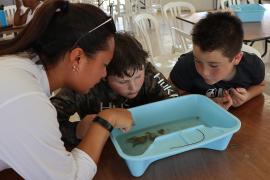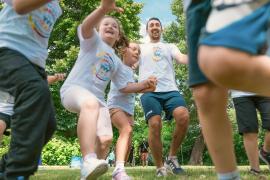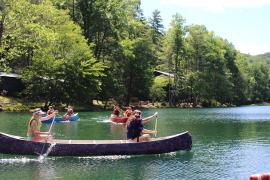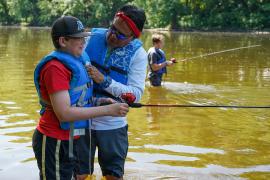Struggles over what our kids read during the summer are not new. I know this because I remember the summer my mom had to wrestle a battered paperback from my hands, saying, “We did not pay for a family vacation so that you could read Indiana Jones and The Last Crusade over and over again.” Which was news to me.
But what constitutes good summer reading? Some parents worry that their kids are not reading enough books. Others worry that the books their kids are reading aren’t good enough. And many worry about both.
One thing is clear: The summer reading slump definitely exists. “Research shows that struggling readers test higher on a standardized test at the beginning of summer than at the end of the vacation,” says John Martin, writer, teacher and founder of Boys Read, a Seattle-based organization that focuses on getting boys to read. “This is a skill that has atrophy.”
In other words, use it or lose it. As Martin notes, “The effect is cumulative: The more summers without reading, the wider the gap each year.”
Let kids choose their own books
The experts I talked with about summer reading all had the same two things to say. One: Do everything in your power to make sure your kids are reading over the summer. Two: Let them choose whatever kinds of things they want to read. In other words, if it’s Indiana Jones, even their third time through Indiana Jones, you’ve succeeded.
“Children’s librarians really promote free choice,” says Blythe Summers, a children’s librarian at the Seattle Public Library. “Kids get told what to read all year long. Summer is a chance to explore their own interests and find their own passions in reading.”
Summers says that the research supports this, showing that “choice is a factor in reading motivation” and that choice helps students develop a positive relationship with reading.
When you let your kids make reading choices, be sure to offer them a wide variety of options. “Often, reading gets associated with one format — usually fiction and chapter books,” says Summers. Some kids respond much better to other formats, such as magazines, nonfiction articles and even how-to manuals, she says.
Parents often undervalue comic books. “Kids improve their reading skills reading at their own level and even below their level,” says Summers. Although comic books contain less text, they keep the mind working, she notes. “The brain links one image with the next one, making the connections that create the story.” This, she says, is a good reading skill — and different from watching television, where everything happens for you.
Getting boys to read
Of course, the drive to get your child to read during the summer starts long before June 1. Michael Thompson, Ph.D., is a nationally known psychologist who has written several books on children, including It’s a Boy! (which sits on my nightstand and is consulted whenever my son does something I would rather he didn’t).
Everyone, Thompson says, knows to read aloud to their children when they are young. But even when kids can read books themselves, parents should keep reading to them. (Thompson suggests reading alternate pages of their child’s favorite books.) They should also keep reading next to them. “Modeling reading is important as kids get older,” says Thompson.
These days, getting boys to read is often a harder task than getting their female counterparts to do so. “You cannot have boys read while everyone in the family is watching television or playing on the computer — including dad,” says Thompson. “If you want your son to be reading this summer, you should be, too.”
He suggests giving older boys audiobooks at bedtime and allowing kids to control the players and listen as many times as they want. He even suggests going to the movies to see a film that also has a book version, so that boys can enjoy both adaptations of the story.
And summertime reading doesn’t have to happen in a hammock. Going to the grocery store? “Today’s ubiquitous car rides are another great time to introduce books,” says Thompson. “Listen to audiobooks and always have the Guinness Book of World Records or some comic books in the back seat, where the kids can reach them.”
Summer camp offers a solution for kids who can’t seem to kick the electronic habit, says Thompson. Camp can teach kids to “live without electronics” and provide a space for them to read during breaks when other friends at camp will be reading as well, he says.
Sharing books with other families
Martin stresses the importance of “having a literate family” and recommends that families regularly read together for 30 minutes to an hour a day.
I would go further and say that parents should consider reading the same books their kids are reading. Popular crossover books, such as Harry Potter and The Hunger Games, are not the only children’s literature that adults might like. Reading contemporary young adult books will give you a great glimpse into kids’ lives — one you might not get out of an otherwise laconic teen.
And if you read the same books, you can talk about them. Asking your fearful 10-year-old about the anxiety-prone Justin in Rachel Vail’s Justin Case might tell you a lot more about your own child than you were able to glean from more direct questioning.
A tween who doesn’t want to talk about her friends might engage in a game. Ask her, if she were a character in Philip Pullman’s The Golden Compass, what kind of daemon would she have? And if your bored high school student has no desire to talk about her future, maybe she’d be willing to talk about washed-up prodigy Colin Singleton from John Green’s An Abundance of Katherines. You might be able to gain a little insight from the way she talks about him.
In the end, it’s a balance. “Parents have to realize that you are doing your child a huge disservice if you allow their reading skills to atrophy during the summer,” says Martin.
On the other hand, you don’t need to be shoving literary masterpieces down your kids’ throats — unless, of course, that’s what they like. “Reading should be fun,” says Summers. “Reading is about getting in touch with your own interests and yourself, and having time to be thoughtful and grow emotionally.”
This post originally appeared at www.ParentMap.com. Wendy Lawrence is a longtime educator and former middle school head at Eastside Prep in Kirkland. Lawrence blogs about parenting and books at thefamilythatreadstogether.com.
The views and opinions expressed by contributors are their own and do not necessarily reflect the views of the American Camp Association or ACA employees.




